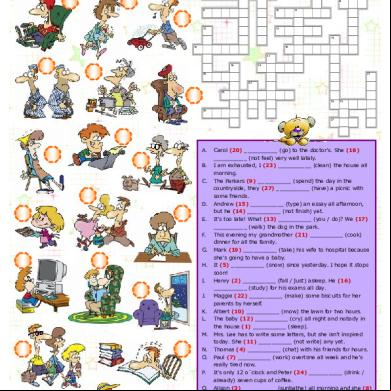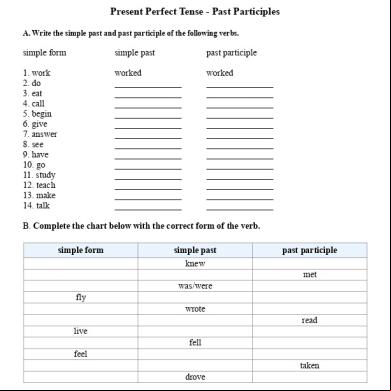Present Perfect 3e212g
This document was ed by and they confirmed that they have the permission to share it. If you are author or own the copyright of this book, please report to us by using this report form. Report 3i3n4
Overview 26281t
& View Present Perfect as PDF for free.
More details 6y5l6z
- Words: 693
- Pages: 2
Present Perfect We use the Present Perfect to: - describe actions which started in the past and continue to the present, with results in the present.(για πράξεις που ξεκίνησαν στο παρελθόν και τα αποτελέσματα τους φαίνονται στο παρόν) Ex: I have eaten eggs for breakfast since I was a child. Where’s the key? I don’t know. I’ve lost it. (I haven’t got it now.)
-
talk about a recent action.(για πρόσφατες ενέργειες)
Expressions used:
Ex: The road is closed. There has been an accident.
ever (ποτέ)
Still (ακόμα) - negative sentences (between the subject and the auxiliary verb)
just (μόλις)
Yet (ακόμα) - negative and interrogative sentences (at the end of the sentence)
already (ήδη)
Already (ήδη) - affirmative and interrogative sentences
yet (ακόμα)
since (από) this…
(between the auxiliary verb and the main verb)
For - + a period of time (για)
never
Since - + a point in time (από)
still
for( για)
To form the affirmative, negative and interrogative forms we use the auxiliary To have, in the Simple Present, and the past participle (3rd column (irregular verbs) or ed (regular verbs)): Affirmative
Negative
Interrogative
subject + auxiliary + main verb subject + auxiliary (neg) + main verb auxiliary verb + subj. + main verb ? (has/have) (p.p.) (has/have not) (p.p.) (has/have) (p.p.) I have worked You have worked He / She / It has worked We have worked You have worked They have worked
I haven't worked You haven't worked He / She / It hasn't worked We haven't worked You haven't worked They haven't worked
Have I worked? Have you worked? Has he / she / it worked? Have we worked? Have you worked? Have they worked?
Present Perfect Continuous We use the Present Perfect Continuous to: - describe an action which ended recently, with a close relation to the present time;(για κάτι που μόλις τελείωσε) Ex: You’re out of breath. Have you been running? (you are out of breath now) - Is it raining? - No, but the ground is wet. It has been raining.
-
describe actions which started in the past and are still happening.(για πράξεις που ξεκίνησαν στο παρελθόν και διαρκούν ακόμα) Ex: Where have you been? I have been looking for you for an hour. It is raining now. It began raining two hours ago and it is still raining. It has been raining for two hours.
The Present Perfect Continuous is usually used with for and since to describe repeated actions, expressing anger or criticism. Since(από) For (για) two hours a week 8 o’clock 1977 20 minutes 50 years Monday Christmas five days a long time 12 May lunchtime six months ages April he was at school
To form the affirmative, negative and interrogative forms we use the auxiliary To have, in the Simple Present, plus the past participle of the verb To be (been) and the main verb in the gerund (ing): Affirmative
Negative
Interrogative
subject + auxiliary + been + main verb (has/have) (p.p. to be) (ing)
Subj. + auxiliary in the neg.+ been + main verb (hasn’t/haven’t) (p.p. to be) (ing)
auxiliary verb + subj.+ been + main verb? (has/have) (p.p. to be) (ing)
I have been working You have been working He / She / It has been working We have been working You have been working They have been working
I haven't been working You haven't been working He / She / It hasn't been working We haven't been working You haven't been working They haven't been working
Have I been working? Have you been working? Has he / she / it been working? Have we been working? Have you been working? Have they been working?
Has Painted is the present perfect simple. The action is finished. We are interested in the result of the action, not in the action itself. Ex: The ceiling was white. Now it is blue. Ann has painted the ceiling. Has been painting is the present perfect continuous. We are interested in the action. It doesn’t matter if the action was finished or not, but it is usually unfinished. Ex: Ann’s clothes are covered in paint. She has been painting the ceiling.
-
talk about a recent action.(για πρόσφατες ενέργειες)
Expressions used:
Ex: The road is closed. There has been an accident.
ever (ποτέ)
Still (ακόμα) - negative sentences (between the subject and the auxiliary verb)
just (μόλις)
Yet (ακόμα) - negative and interrogative sentences (at the end of the sentence)
already (ήδη)
Already (ήδη) - affirmative and interrogative sentences
yet (ακόμα)
since (από) this…
(between the auxiliary verb and the main verb)
For - + a period of time (για)
never
Since - + a point in time (από)
still
for( για)
To form the affirmative, negative and interrogative forms we use the auxiliary To have, in the Simple Present, and the past participle (3rd column (irregular verbs) or ed (regular verbs)): Affirmative
Negative
Interrogative
subject + auxiliary + main verb subject + auxiliary (neg) + main verb auxiliary verb + subj. + main verb ? (has/have) (p.p.) (has/have not) (p.p.) (has/have) (p.p.) I have worked You have worked He / She / It has worked We have worked You have worked They have worked
I haven't worked You haven't worked He / She / It hasn't worked We haven't worked You haven't worked They haven't worked
Have I worked? Have you worked? Has he / she / it worked? Have we worked? Have you worked? Have they worked?
Present Perfect Continuous We use the Present Perfect Continuous to: - describe an action which ended recently, with a close relation to the present time;(για κάτι που μόλις τελείωσε) Ex: You’re out of breath. Have you been running? (you are out of breath now) - Is it raining? - No, but the ground is wet. It has been raining.
-
describe actions which started in the past and are still happening.(για πράξεις που ξεκίνησαν στο παρελθόν και διαρκούν ακόμα) Ex: Where have you been? I have been looking for you for an hour. It is raining now. It began raining two hours ago and it is still raining. It has been raining for two hours.
The Present Perfect Continuous is usually used with for and since to describe repeated actions, expressing anger or criticism. Since(από) For (για) two hours a week 8 o’clock 1977 20 minutes 50 years Monday Christmas five days a long time 12 May lunchtime six months ages April he was at school
To form the affirmative, negative and interrogative forms we use the auxiliary To have, in the Simple Present, plus the past participle of the verb To be (been) and the main verb in the gerund (ing): Affirmative
Negative
Interrogative
subject + auxiliary + been + main verb (has/have) (p.p. to be) (ing)
Subj. + auxiliary in the neg.+ been + main verb (hasn’t/haven’t) (p.p. to be) (ing)
auxiliary verb + subj.+ been + main verb? (has/have) (p.p. to be) (ing)
I have been working You have been working He / She / It has been working We have been working You have been working They have been working
I haven't been working You haven't been working He / She / It hasn't been working We haven't been working You haven't been working They haven't been working
Have I been working? Have you been working? Has he / she / it been working? Have we been working? Have you been working? Have they been working?
Has Painted is the present perfect simple. The action is finished. We are interested in the result of the action, not in the action itself. Ex: The ceiling was white. Now it is blue. Ann has painted the ceiling. Has been painting is the present perfect continuous. We are interested in the action. It doesn’t matter if the action was finished or not, but it is usually unfinished. Ex: Ann’s clothes are covered in paint. She has been painting the ceiling.





